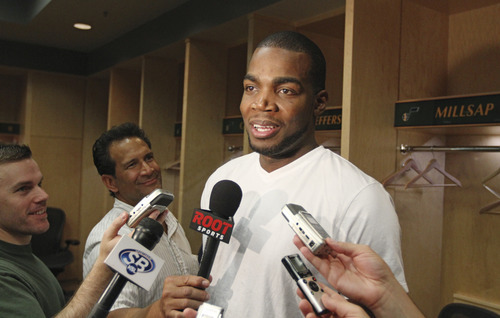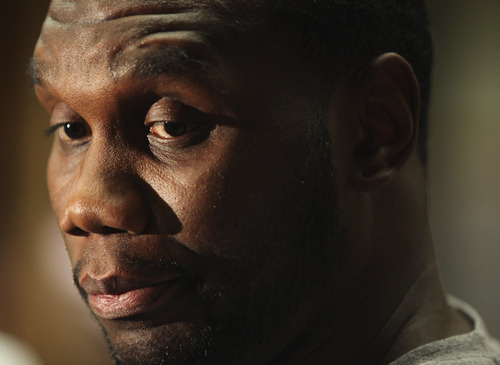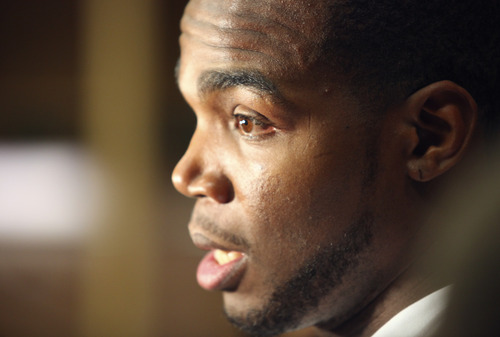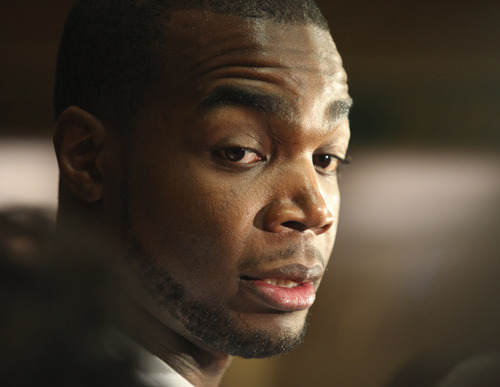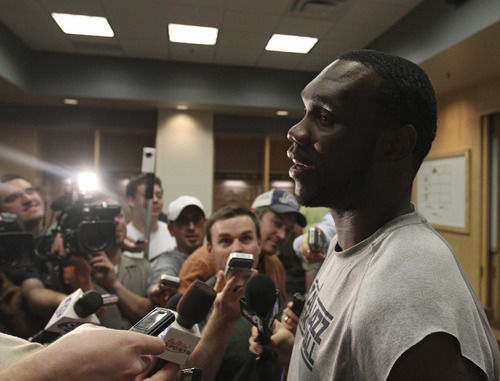This is an archived article that was published on sltrib.com in 2012, and information in the article may be outdated. It is provided only for personal research purposes and may not be reprinted.
Derrick Favors' future as a Jazz power forward is very promising. His prospects of becoming an NBA general manager? Less favorable.
As the Jazz concluded their season this week, Favors sized up their personnel as "perfect," going forward.
In a way, he's right. Having overachieved by winning the full-season equivalent of 45 games in 2011-12, this team is well positioned for another jump. By keeping the roster intact, the Jazz can move to the 50-win level and give themselves a better chance to win a playoff series.
They've done this before, going from average to reasonably good. The trick is advancing from that point, which is why this offseason is much more complicated than Favors' overview suggests.
Before launching into those issues, I'll credit the Jazz for this season's 36-30 record and playoff-qualifying performance. Saying they "would do well to win 30 games," my forecast as of the labor settlement in November, underestimated them. Actually, they were right on that schedule at the halfway point (15-18), before responding with a strong finish.
In the second half, Tyrone Corbin moved closer to becoming a proven coach, second-year players Gordon Hayward and Favors improved, center Al Jefferson became a dependable scorer and point guard Devin Harris played much better.
I also suggested the biggest hope for this season would be some young players' "showing signs of becoming franchise cornerstones." That happened to a degree that led Harris to cite the Jazz's "extreme amount of potential."
But tough decisions must be made about the future of Jefferson and forward Paul Millsap, each entering 2012-13 with an expiring contract. What happens with them affects Favors, who deservedly expects to become a starter.
The biggest flaw in the Jazz's approach to 2011-12 was they probably developed the wrong guy: Jefferson. Their offense was built around a player who may not be here forever, because the salary cap won't let Jazz keep everybody, and because they need to maximize Favors and Enes Kanter.
Reviewing the Deron Williams-Carlos Boozer era is instructive, regarding what we can expect from the Jazz's development. The Jazz are about where they were in 2005-06 when they went 41-41 and barely missed the playoffs, with Williams used inconsistently as a rookie and Boozer often injured.
They jumped to 51-31 the next year, when Williams improved markedly, Boozer stayed healthy and a trade for Derek Fisher gave them leadership and flexibility. The Jazz then went 54-28 in 2007-08, boosted by a midseason trade for Kyle Korver.
But injuries and payroll problems — including Andrei Kirilenko's contract — limited any more growth of the Williams-Boozer Jazz. The eventual breakup was such that Millsap and C.J. Miles this season became the only holdovers from two years ago.
So the reality is that general manager Kevin O'Connor must decide what will be the team's core, and how to keep it together. He may have to sacrifice some of next season's potential improvement, just to better position the team for years to come.
That means finding an outside shooter and letting him shoot. I keep wondering what O'Connor and Corbin, then an assistant coach, missed from watching Korver (and Mehmet Okur, as an unconventional center) play for their team. The extreme inside-out structure with Jefferson succeeded in getting the Jazz into the playoffs. But once San Antonio made it tough for him, the Jazz had few answers, without any perimeter threat.
Among the more revealing comments during Tuesday's locker-cleanout session was Miles' basically saying the Jazz's wing players were told not to shoot 3-pointers. This team can go only so far as the basketball equivalent of a run-oriented football team in a passing world.
If they stay the same next season, the Jazz will get better. By changing, they may not improve as much immediately. But if they want to do anything worthwhile in 2013-14 and beyond, they have to do something different right now. —
Full schedule projections
2011-12 Western Conference playoff qualifiers, with records projected to an 82-game season:
San Antonio • 62-20
Oklahoma City • 59-23
L.A. Lakers • 51-31
Memphis • 51-31
L.A. Clippers • 50-32
Denver • 47-35
Dallas • 45-37
Utah • 45-37


